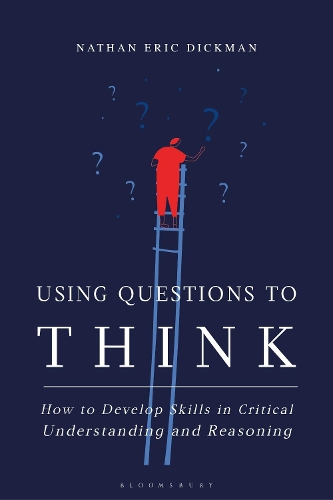
Using Questions to Think: How to Develop Skills in Critical Understanding and Reasoning
(Paperback)
Available Formats
Publishing Details
Using Questions to Think: How to Develop Skills in Critical Understanding and Reasoning
By (Author) Nathan Eric Dickman
Bloomsbury Publishing PLC
Bloomsbury Academic
29th July 2021
United Kingdom
Classifications
Tertiary Education
Non Fiction
Philosophy of mind
Literature: history and criticism
160
Physical Properties
Paperback
288
Width 156mm, Height 236mm, Spine 24mm
400g
Description
Our ability to think, argue and reason is determined by our ability to question. Questions are a vital component of critical thinking, yet we underestimate the role they play. Using Questions to Think puts questioning back in the spotlight. Naming the parts of questions at the same time as we name parts of thought, this one-of-a-kind introduction allows us to see how questions relate to the definitions of propositions, premises, conclusions, and the validity of arguments. Why is this important Making the role of questions visible in thinking reasoning and dialogue, allows us to: - Ask better questions - Improve our capability to understand an argument - Exercise vigilance in the act of questioning - Make explicit what you already know implicitly - Engage with ideas that contradict our own - See ideas in broader context Breathing new life into our current approach to critical thinking, this practical, much-needed textbook moves us away from the traditional focus on formal argument and fallacy identification, combines the Kantian critique of reason with Hans-Georg Gadamers hermeneutics and reminds us why thinking can only be understood as an answer to a question.
Reviews
Drawing on hermeneutic phenomenology, Dickman focuses inquiry on the necessity of genuine questioning for understanding and sense. Elegantly organized and including a helpful appendix for instructors, this insightful text offers a fresh approach and will be a welcome addition to courses in critical thinking, philosophy of language, and more. * Robert H. Scott, Associate Professor of Philosophy, University of North Georgia, USA *
Drawing on phenomenology, hermeneutics, and the philosophy of language, this text explores both the technical and existential dimensions of reasoning. Through challenging yet inviting prose, Dickman offers a welcome and innovative approach to critical thinking that brings students along on an authentic philosophical journey into the nature of questioning. * Rebecca Scott, Assistant Professor of Philosophy, Harper College, USA *
Author Bio
Nathan Eric Dickman is Assistant Professor of Philosophy at the University of the Ozarks, USA.
